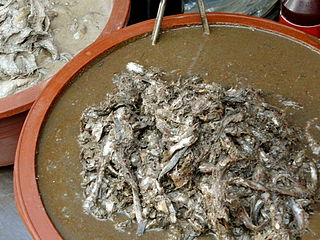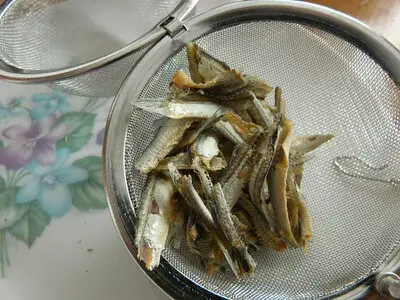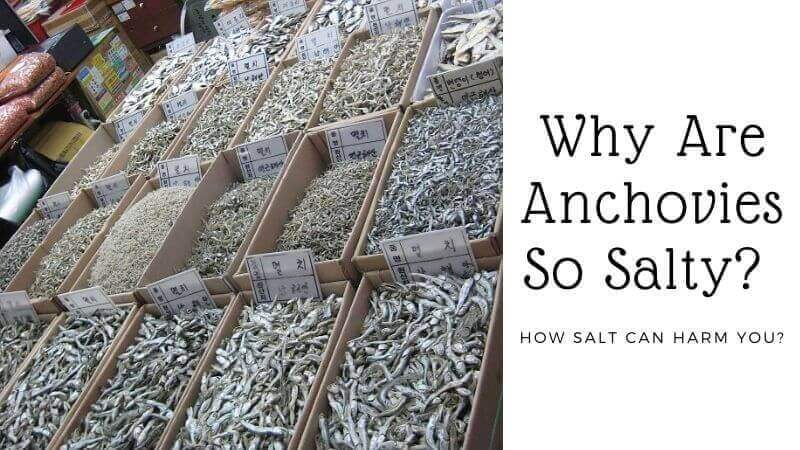Image Credit: KJRSeattle (CC license)
Anchovies can polarize people like no other food can. Whether packed with salt, preserved in oil, or doused in vinegar, these fast-growing silverfish have got us on one side of the fence or the other.
Many people have had bad experiences with anchovies pizza, the number one reason this fish has a stinky reputation. But for me, anchovies are comfort food.
They remind me of my school days when my mom used to cook them with tomato chutney, and the aroma would fill the air.
Back in Nepal, anchovies weren’t found in supermarkets. Relatives or family friends who’d traveled to Singapore or Brunei would bring anchovies as a gift and divide them painstakingly between numerous receivers. They were definitely a delicacy.
So, I was surprised when I first came to the States and realized they’re grocery staples anywhere you go and come in a couple of different formats and sizes.
Anyway, coming back to the query, the reason anchovies stir polarizing views among netizens is their salt content. While some believe the saltiness is what makes these fish special, others are rightly concerned about high levels of iodine and its effect on the human body.
But first things first – why are anchovies so salty to begin with? Keep reading to know!
Table Of Content
Why Are Anchovies So Salty?
Anchovies are salty, like most seafood, because they live in saltwater. However, the saltiness mainly comes from the preservation method that uses plenty of salt. Salt is used as a preservative because it reduces the water activity of foods. The fish can be made less salty by rinsing or soaking them in water, vinegar, or wine.
Before I tell you how to remove excess salt from the anchovies, let’s quickly look at what they’re really.
What Are Anchovies?

Anchovies are slender, salty little silverfish mainly found in the Black Sea, Mediterranean, Atlantic, and Pacific waters. In terms of size, they grow around 8-10 cm and generally live in huge shoals containing thousands of fish.
Anchovies are one of the oiliest fish around. So, when all that oil is exposed to the air, it quickly oxidizes – turning the fish rancid and spoiling it too soon.
Naturally, their delicate flavor only lasts for a short time after they’re caught. Thus, they’re seldom exported fresh.
Instead, the anchovies are gutted, fileted, salt-cured, and packed in oil, vinegar, or salt in tins and jars. Naturally, the ones packed with salt are more flavorful.
When preserved, anchovies take on an intense but sophisticated fish flavor that’s not always welcome.
Appearance-wise, these fish have long and slender bodies with silver scales.
Since they live in big groups, it’s pretty easy for fishermen to catch them. They’re seldom farmed commercially and are almost always caught in the wild.
Now that you know what anchovies really are, let’s try to find out what they taste like.
What Do Anchovies Taste Like?
Anchovies don’t enjoy a great reputation among food connoisseurs. They’re often described as being too salty or too fishy. But I’d say anchovies would be right at the top of the list of the most misunderstood foods in the world.
Fresh anchovies, quite rare to get your hands on, have a mild fishy flavor and are reportedly quite rich in taste. They are described as having the same flavor notes as sardines.
Well, the flavors and texture change pretty drastically when they are cured and preserved. Afterward, they become intensely fishy and develop an umami flavor. Many people report that anchovies taste like aged cheese or caramelized meat.
Based on what method was used for preservation, the taste and texture differ as follows:
Whole salted anchovies: These have a meatier and firmer texture. The flavors are mellower.
Oil-packed anchovies: These have a less intense flavor than fish preserved in vinegar or brine. Also, the meat tends to be softer.
Anchovy paste: These have the most concentrated flavors of all with a smooth, spreadable texture.
Are All Anchovies Salty?
In most cases, yes – all anchovies are salty. Since they’re naturally found in seawater, they have a salty taste profile. Reportedly, anchovies found in brackish water have a relatively lower salt content than those from seawater.
However, the degree of saltiness varies mainly depending on the preservation method. Fresh anchovies, which are far too uncommon, are the least salty of all.
On the other hand, anchovies cured and packed with salt are the saltiest of the bunch. When you buy preserved anchovies, whether in brine, oil, or vinegar, they’re cured in salt for a long time first.
Well, there’s this certain Mediterranean method of storing anchovies that includes marinating them in a blend of spices, herbs, vinegar, and oil. Anchovies preserved this way tend to be less salty but more flavorful.
Now that we have established that anchovies – all of them – are salty, let’s quickly skim through the techniques you can use to remove the excess salt.
How To Remove Excess Salt From Anchovies?

Either with dry salt or with brine, salt curing is still the most common and widely available method of preserving fish. To remove the excess salt, you need to soak anchovies in cool water or milk for about 30 minutes.
Some fish need to be soaked overnight but not anchovies. The fish’s texture will become overly mushy and soft if they’re exposed to moisture for too long.
What Happens When You Consume Too Much Salt?
Even though we love anchovies, there’s no denying that they contain a generous – sometimes alarming – amount of salt. And that’s not always good. Although anchovies are packed with minerals like copper and magnesium, their salt content can elevate blood pressure levels.
First things first, salt is made up of around 40% sodium and 60% chloride. While salt is essential for muscle and nerve function, chloride helps maintain proper water and mineral balance.
Now, let’s look at some potential risks of consuming too much salt.
Short-term Effects Of Consuming Too Much Salt
The short-term effects of consuming high amounts of salt are water retention, a momentary rise in blood pressure, excess thirst, and in some rare cases, hypernatremia.
Water Retention
One of the first effects of consuming excess salt is that you will end up feeling more puffy and bloated than usual. This happens because your kidneys try to maintain a certain sodium-to-water ratio in the body. Thus, the kidneys will hold on to extra water to compensate for the sodium you just consumed.
And this increased water retention will result in swelling, especially in your hands and feet.
Increased Blood Pressure
A salty meal causes a large volume of blood to flow through your arteries and blood vessels. And this leads to a temporary but quick rise in blood pressure.
However, new research has shown that salt-resistant people may not experience a rise in blood pressure even after consuming salt-rich meals.
While a person’s sensitivity to salt is believed to be influenced by factors like hormones and genetics, obesity and aging definitely play a significant role.
Intense Thirst
Eating a salty meal will leave you thirsty with a dry mouth. This is your body encouraging you to correct the sodium-to-water ratio.
So, what happens next?
The resulting increase in fluid intake will cause you to pee more than usual. However, if you deliberately avoid consuming water to avoid urinating, your body’s sodium level will rise beyond the safe level and result in hypernatremia.
Some other signs of hypernatremia are sleeping difficulties, restlessness, and decreased urination.
Long-term Effects Of Consuming Too Much Salt
The long-run effects of consuming too much salt are that it will chronically raise your blood pressure and increase the chances of suffering from stomach cancer. The risks of heart disease that can lead to premature death are also deemed a potential risk, although more research is needed to confirm this.
Increased Blood Pressure
Several pieces of research have shown that consuming salt-rich diets consistently can elevate blood pressure in the long run. For example, 2 in-depth studies revealed that a reduction in salt intake of 4.4 grams per day will lower diastolic and systolic blood pressure.
Also, these effects are thought to be much higher in salt-sensitive individuals than those who aren’t as salt-sensitive.
Stomach Cancer Risk
A lot of new research has shown that a higher salt intake is linked with stomach cancer.
For example, a review including 268,000 participants showed that those with a median salt intake of 3 grams per day can have up to a 68% higher risk of stomach cancer than ones with a median salt intake of 1 gram per day.
Risks Of Heart Disease
Although the connection between salt-rich diets and heart disease is still controversial, several new studies have shown that a rise in blood pressure due to high salt intake can cause the blood vessels and arteries to stiffen.
This naturally leads to a higher risk of heart disease.
Before we end this article, let’s look at some of the most frequently asked questions on anchovies.
Frequently Asked Questions
How Do You Remove Salt From Salted Anchovies?
You can remove salt from salted anchovies by rinsing or soaking them in water for 30 minutes. I came across a tip that suggested scraping off the fish’s exterior to get rid of the salt, but I found this method too fussy.
Why Are Anchovies Saltier Than Other Fish?
Anchovies are saltier than other fish because they are preserved using salt. Their high oil content means they get rancid a lot soon. Therefore, they need to be cured using salt, making them much saltier.
Can You Get Unsalted Anchovies?
It’s hard to get your hands on unsalted anchovies. For that, you’d have to purchase fresh anchovies. And since anchovies spoil too fast, you can seldom find them in a fresh state.
Are Anchovies Healthy?
Even in a small serving, anchovies are packed with nutrients like niacin, iron, calcium, iron, selenium, and omega-3 fatty acids EPA and DHA. However, their high salt content could also lead to bloating and high blood pressure.
So, we’d suggest eating anchovies in moderation.
